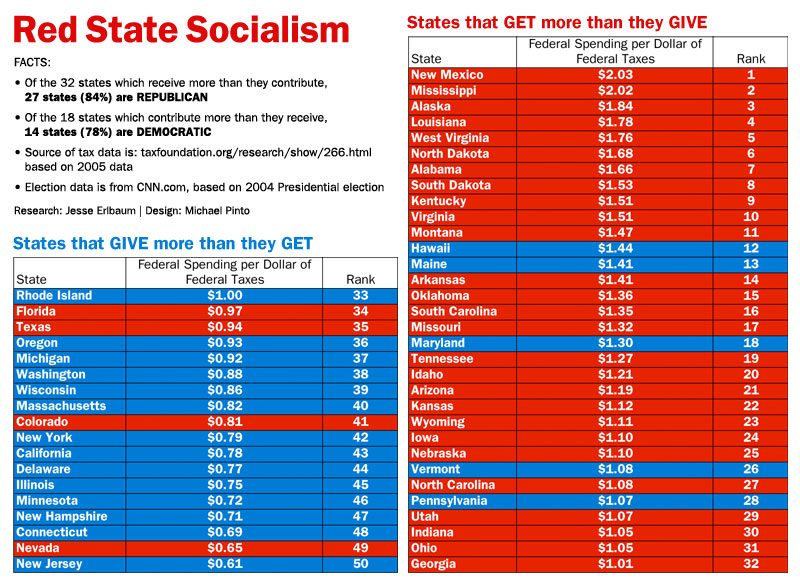@okie,
okie wrote:Tyranny is an exaggerated term in the vast majority of cases, but it still is descriptive of the danger.
Ok, how about one single example wheere it is not an exaggerated term and that the Electoral College protects against it.
Every time I see the merits of this system discussed I see people parrot the same old line about the genius of the founding fathers and how the electoral college protects us from tyranny of the majority.
I've never seen anyone come up with any good example of what it's supposed to be protecting us against.
Quote:In overwhelming popular vote victories, the electoral college almost always agrees, but in very narrow popular vote victories, the electoral college may provide a different verdict, so it does inject a check and balance that may be due to regional interests, interests that are valid, so I think it is valuable to water down the effect of the popular vote at the margins.
What regional interests that are valid? Again, I'm honestly interested in hearing about this. This would be a very compelling argument for the system but I've never seen someone come up with a regional interest at all, much less one that validates the disproportionate representation some states receive.
If the whole argument for it is that it just may possibly, perhaps symbolically, protect smaller states then don't you think it's a sight weaker than your initial claim that it protects "vital" state interests.
Quote:Things like agricultural and energy interests, and the producers of such. For example, I pick 2 or 3 of potentially hundreds of them, but Wyoming produces a large portion of the coal that is mined, that is shipped to almost half of the states or more, for energy production. This is an immensely important industry, vital to the nations well being. Wyoming understands this industry infinitely more than the residents of New York City or Chicago.
These are examples of state interests. What I've been asking for is an example where the electoral college protects these very interests from tyranny of the majority. I don't dispute that there are conflicting regional interests, I dispute that these are protected by the electoral college.
Quote:Again, clear majorities still elect presidents, typically, but the electoral college gives a voice to regional and state interests that they would not have without the electoral college, and I think this is extremely important.
Without the electoral college they'd would still have a voice Okie. In fact they'd have the same voice as any other citizen. I think you meant to say that without the system they wouldn't have an inflated voice worth more than those in some other states.
Quote:All of this should be so obvious if you would consider all of this.
I think I've considered it at least as much as you Okie, as subjective as many components to this are I don't think you should be surprised if people can disagree on them, even being equally informed.
Like I've said, I'd find an example of realistic protection against tyranny of the majority to be very convincing. Joe had me thinking my position very hard with his arguments about the flaws of other systems and this
is a position I'd be willing to reconsider if a good example of what it's supposed to protect against can be made.
Quote:I already explained it, and tyranny is not the proper word in most cases, but the word describes the effect in theory.
Tyranny sounds pretty bad, for sure, but I'd accept something pretty simple:
Any example where the interests of the majority conflict with the interests of the minority AND the interests of the minority should be honored.
There are always going to be competing interests, but that doesn't mean that the minority should have their way.
Quote:One example I would cite, is what if the majority of the population receives government welfare, they will vote for the continuation of that practice, at the expense of the producers, the farmers, the mining industry, the oil industry, and other industries that may be concentrated in one state or another.
This is an example of the concept of tyranny of the majority, but it's not a realistic one. An example like this that the system realistically protects against is what I'd find convincing.
Quote:Fact is, I think the non-producers or the marginal producers are already wreaking havoc in this country, they have enough power at the ballot box to vote for anyone that promises them more goodies. This has been predicted as a logical progression and potential downfall of democracies. It may happen with the electoral college, but at least the electoral college provides a very small deterrent in my opinion.
I think you have it backwards. Look at this graph of states that give more than they get, and get more than they give:

If any states can be considered "marginal producers" it's the very states that get inordinate representation in this system. If anything, this system is protecting the marginal producers, not the opposite.
Quote:Quote:
I've not advocated the abolition of States Okie.
If not, then you should be able to see the value of the electoral college.
Let's just say I'm daft or something and I am unable to see it. Why don't you enlighten me. Show me how advocating the abolition of the electoral college is the same as advocating the abolition of the states.